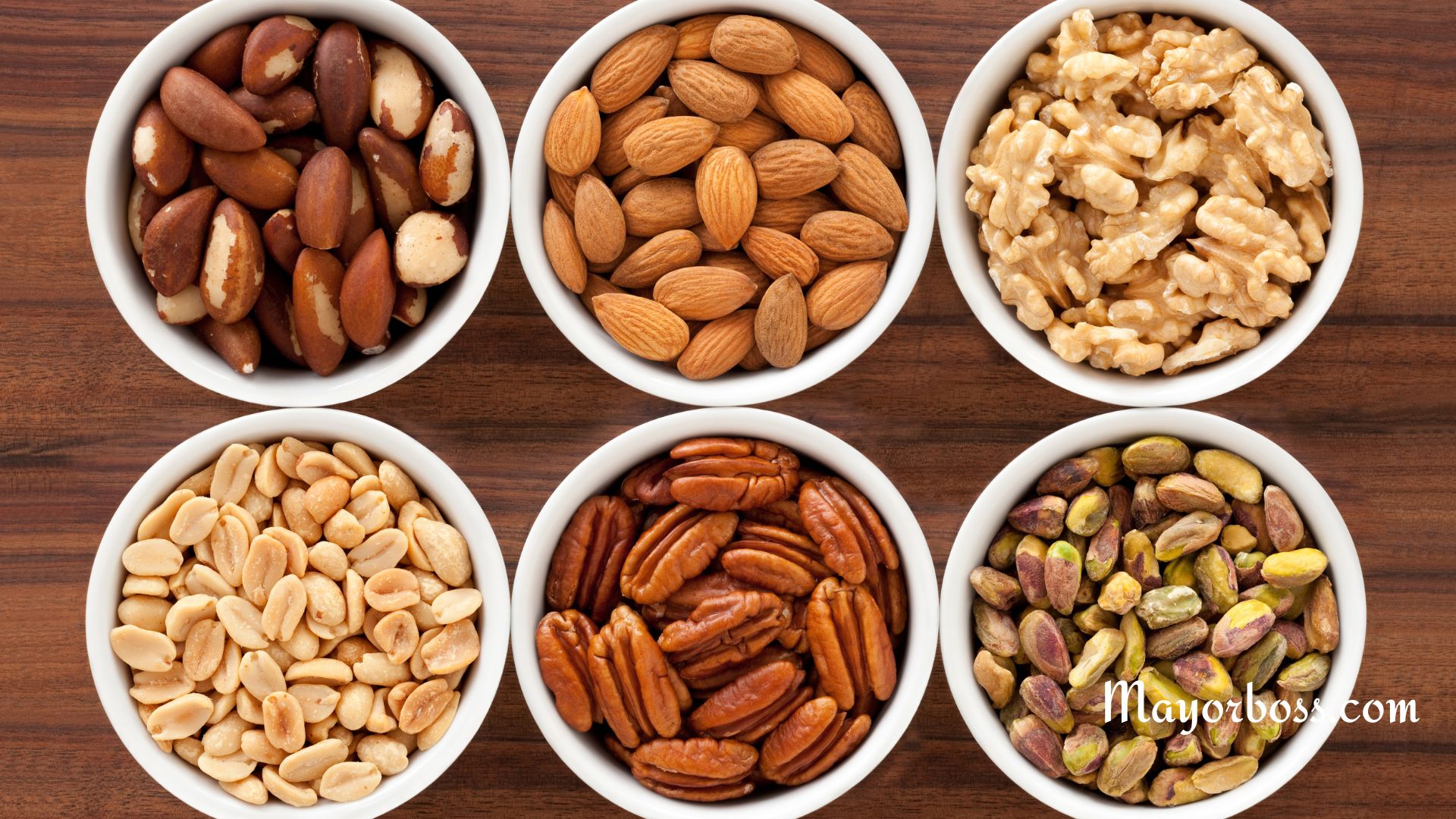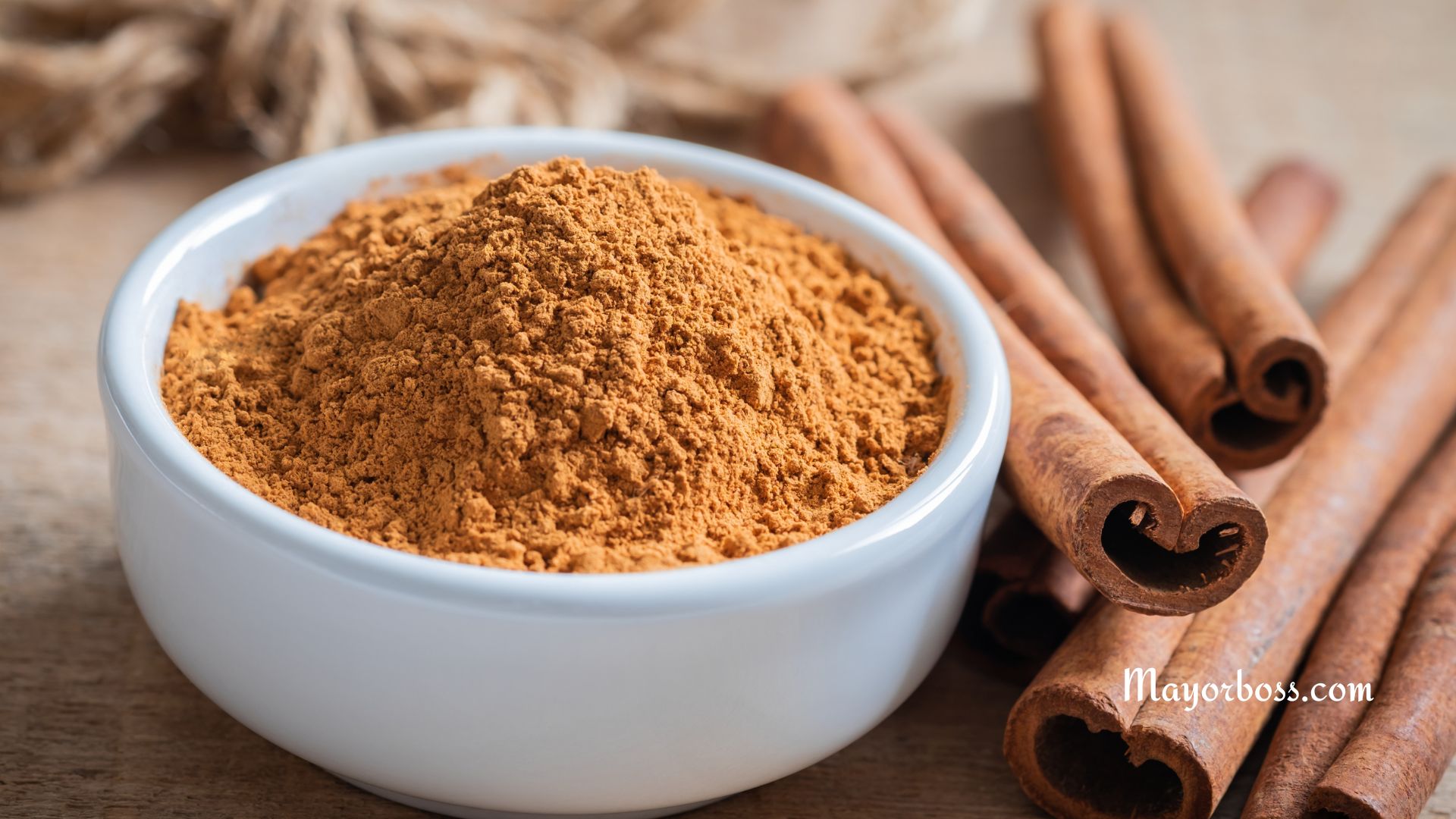10 Types of Nuts and Their Benefits
Are you looking for the best types of nuts that can benefit your body? Almonds are high in vitamin E and can improve cholesterol levels, while cashews are a good source of magnesium and can help regulate blood pressure. Pistachios are rich in antioxidants, and walnuts are high in omega-3 fatty acids, which can improve brain function.
Incorporating a variety of nuts into your diet can lead to a healthier lifestyle. Here are ten types of nuts and their benefits:

1. Almonds
Almonds are one of the most popular nuts. They’re actually really healthy for you!
Almonds are amazingly high in healthy fats, protein, and fiber, which can help you feel full and satisfied after eating them. This can help you eat less junk food and make healthier choices overall.
Almonds also contain many vitamins and minerals that your body needs to stay healthy, such as vitamin E, magnesium, and calcium.
These nutrients can help keep your bones strong, your heart healthy, and your brain functioning well. According to research, eating almonds daily can help you maintain a healthy weight.
This is because the healthy fats and fiber in almonds can help regulate the metabolism of fat.
They also control your appetite and keep you from overeating. However, it’s important to remember that almonds are also high in calories, so you shouldn’t eat too many of them in one sitting.
A small handful (about 1 ounce) is a good serving size to aim for.
2. Brazil Nuts
Brazil nuts are a type of nut that comes from the Brazil nut tree, which is native to South America. They are a delicious and nutritious food that can provide several health benefits.
One of the main benefits of eating Brazil nuts is that they are an excellent source of selenium.
Selenium is a mineral that is important for many functions in the body, including immune function, thyroid function, and antioxidant defense.
Eating just one or two Brazil nuts per day can provide your body with all the selenium it needs for the day.
Another benefit of eating Brazil nuts is that they contain plenty of healthy fats, including monounsaturated and polyunsaturated fats.
These types of fats are important for heart health and can help to lower cholesterol levels in the blood.
In addition to being a good source of selenium and healthy fats, Brazil nuts are also rich in other important nutrients, including vitamin E, magnesium, and zinc.
These nutrients are essential for a healthy immune system, strong bones, and overall good health.
One thing to keep in mind when eating Brazil nuts is that they are quite high in calories, so it’s important to eat them in moderation as part of a balanced diet.
But as long as you enjoy them in moderation, they can be a tasty and nutritious addition to your diet.
3. Peanuts
Firstly, they are a great source of plant-based protein. This means that they contain important building blocks called amino acids that our body needs to repair and grow tissues, such as muscles and organs.
Eating peanuts can help you meet your daily protein needs, especially if you don’t eat meat or dairy.
Secondly, peanuts are a good source of healthy fats. They contain mostly monounsaturated and polyunsaturated fats, which have been proven to lower cholesterol levels and reduce the risk of heart disease.
These fats are also crucial for brain function, hormone production, and maintaining healthy skin. Thirdly, peanuts have fiber. Fiber is important for digestion and helps keep you feeling full and satisfied after a meal.
Eating foods high in fiber can also help regulate blood sugar levels and reduce the risk of certain types of cancer.
Lastly, peanuts are packed with vitamins and minerals. They contain vitamin E, which is important for healthy skin and immune function, and magnesium, which is important for muscle and nerve function.
Peanuts are also a good source of other vitamins and minerals like folate, niacin, and phosphorus.
However, it is important to keep in mind that peanuts are high in calories and fat, so it is crucial to eat them in moderation and pay attention to portion sizes.
Eating too many peanuts or other high-calorie foods can lead to weight gain and other health problems. So, enjoy peanuts as a part of a healthy and balanced diet!
4. Walnuts
Walnuts are a type of nut that is shaped like a little brain. They are really tasty and can be eaten by themselves or added to many different foods like oatmeal, yogurt, or salads.
One of the biggest health benefits of eating walnuts is that they are good for your heart. This is because they contain healthy fats called omega-3 fatty acids.
These types of fats can help lower bad cholesterol levels in your blood and decrease your risk of heart disease.
Some research suggests that walnuts also have antioxidants, which help protect your body from damage. Antioxidants can help prevent diseases like cancer and Alzheimer’s.
Another good thing about walnuts is that they are a good plant protein and fiber source. Protein helps your body build and repair muscles, while fiber helps keep your digestive system healthy and regular.
Lastly, walnuts have vitamins and minerals that your body needs to work properly. These include things like vitamin E, magnesium, and phosphorus.
Vitamin E is good for your skin, while magnesium and phosphorus help keep your bones strong.
So, in summary, eating walnuts can be really good for your heart, brain, and body in general because they have healthy fats, antioxidants, protein, fiber, vitamins, and minerals. Plus, they taste delicious!
5. Hazelnuts
Hazelnuts are a type of nut that is native to Europe and Asia but are now grown all over the world.
They’re a great snack to have on hand because they’re delicious and also have a lot of health benefits.
One of the primary benefits of consuming hazelnuts is that they’re packed with nutrients. They’re a good source of protein, healthy fats, fiber, and vitamins and minerals like vitamin E, magnesium, and potassium.
Eating hazelnuts can help you feel full and satisfied, which can prevent overeating and help you maintain a healthy weight.
Hazelnuts are also good for your heart. Studies have shown that eating nuts like hazelnuts can lower your risk of heart disease.
This is because they contain healthy fats that can help lower your cholesterol levels and reduce inflammation in your body.
Another benefit of eating hazelnuts is that they may help improve your brain function. Hazelnuts are particularly rich in vitamin E, which has been shown to improve cognitive function in older adults. Eating nuts like hazelnuts regularly may help keep your brain healthy as you age.
6. Cashews
Cashew nuts are not only delicious, but they also offer many health benefits. First, they are a good source of plant protein, which helps your body grow and repair itself.
Several studies suggest cashews also contain healthy fats, like monounsaturated and polyunsaturated fats, which can help lower your risk of heart disease and stroke.
And that’s not even all: Cashews also contain essential vitamins and minerals, such as magnesium, which helps keep your bones strong, and zinc, which helps your immune system fight off infections.
Furthermore, they also contain fiber, which can help keep your digestive system healthy and regular.
Eating cashews can also help you feel full and satisfied, which can be helpful if you’re trying to manage your weight.
This is because the protein and healthy fats in cashews take longer to digest, which means they can help you feel fuller for longer periods of time.
However, it’s important to remember that cashews are high in calories, so you should eat them in moderation. A handful of cashews (about 1 ounce) is a good serving size to enjoy as a snack.
7. Macadamia Nuts
Macadamia nuts are a type of tree nut that is native to Australia but are now grown in many other parts of the world, including Hawaii and California.
These nuts have a hard outer shell and a creamy, rich flavor that many people enjoy. One of the main benefits of eating macadamia nuts is that they are a good source of plant sterols and healthy fats.
In fact, over 75% of the fat in macadamia nuts is monounsaturated fat, which is a type of fat that has been shown to have health benefits such as reducing inflammation and improving cholesterol levels.
Another benefit of macadamia nuts is that they are rich in fiber, which is vital for maintaining healthy digestion and preventing constipation.
Eating a diet that is high in fiber can also help reduce the risk of developing certain diseases, such as heart disease and type 2 diabetes.
Macadamia nuts are also an excellent source of several essential vitamins and minerals, such as vitamin B1, magnesium, and manganese.
These nutrients play important roles in maintaining overall health and wellness, including supporting healthy bones, nerves, and muscles.
8. Pecans
Beyond being delicious, pecans also have some great benefits for your health. For one thing, they’re packed with nutrients like fiber, protein, and healthy fats. These nutrients can help keep you feeling full and satisfied, which can be helpful if you’re trying to maintain a healthy weight.
Pecans are also loaded with antioxidants, which are compounds that help protect your cells from damage. This can be really important for preventing diseases like cancer and heart disease.
Another advantage of eating pecans is that they can help lower your cholesterol levels. Cholesterol is a type of fat that can build up in your arteries and increase your risk of heart disease.
But the healthy fats in pecans can actually help lower your “bad” cholesterol levels, which can reduce your risk of heart problems.
In addition to these benefits, pecans are a rich source of vitamins and minerals. For example, they have lots of vitamin E, which is vital for keeping your skin and eyes healthy. They also have minerals like magnesium, which can help keep your bones strong.
9. Pine Nuts
Pine nuts are actually the edible seeds of pine trees. They’re small, delicate, and have a slightly sweet and nutty flavor. Here are some of the benefits of including pine nuts in your diet:
- Good for your heart: Pine nuts are well known for their amazing monounsaturated and polyunsaturated fats, which can help reduce bad cholesterol (LDL) levels in your blood. This can lower your risk of heart disease and stroke.
- High in antioxidants: Pine nuts contain various antioxidants, including vitamin E and phenolic compounds. Antioxidants help protect your cells from damage caused by free radicals, which can contribute to aging and diseases like cancer.
- Source of essential vitamins and minerals: Pine nuts are a good source of vitamins B1 and B6, which help your body convert food into energy. They also contain minerals like magnesium, zinc, and potassium, which support nerve and muscle function, blood pressure regulation, and bone health.
- Help with weight control: Despite being high in calories, pine nuts can actually help you lose weight. This is because they’re high in protein and fiber, which can help you feel full and satisfied after eating.
10. Pistachios
Just like other nuts, pistachios are rich in plant protein. As explained earlier, protein is essential because it helps your body build and repair tissues, like your muscles and organs. It also helps you feel full, so you don’t get hungry as quickly.
Secondly, pistachios are high in fiber. Fiber helps keep your digestive system healthy and regular. It also helps lower your chance of heart disease, type 2 diabetes, and intestinal cancer.
These nuts also contain healthy fats, which help fight inflammation and can lower cholesterol.
Most of all, pistachios are packed with vitamins and minerals. For instance, they contain vitamin B6, which helps your body produce energy from your food. They also have potassium, which is important for keeping your blood pressure healthy.
Conclusion
Nuts are delicious, nutritious foods that offer a variety of health benefits when consumed in moderation. They can be enjoyed on their own as a snack or added to meals for extra flavor, texture, and nutrition.
With so many types of nuts to choose from, there’s sure to be one that fits your taste preferences and dietary needs. So go ahead and snack on some nuts today!






